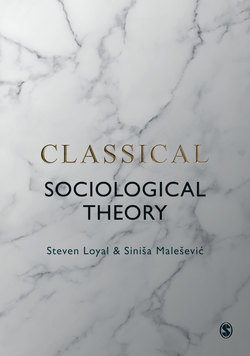Читать книгу Classical Sociological Theory - Sinisa Malesevic - Страница 14
На сайте Литреса книга снята с продажи.
Peloponnesian War
ОглавлениеIn 404 bce, following the defeat of Athens in the Peloponnesian War against Sparta (431–404 bce), Plato witnessed an oligarchic revolution, led by his uncles Critias and Charmides. Many of these oligarchs, who became known as the ‘Thirty Tyrants’, blamed the system of democracy for the defeat. However, after their removal, Socrates was executed on the grounds of impiety and corrupting the minds of the youth. Plato abandoned politics and left Athens, travelling and studying for a dozen years or so. During his travels he first went to Megara, Theodorus in Cyrene, then to Sicily and lastly to Egypt. In Syracuse in Sicily, as well as under Archytas at Taras, in the south of Italy, he studied Pythagorean philosophy.
Steeped in politics Plato travelled to Syracuse on three occasions in the hope of educating its tyrants, Dionysius I and II, to become philosopher kings, and to facilitate an end to the malaise of the times by unifying Greece against Persian influence (Gouldner, 1967). His first visit had been arranged by Dion, cousin to Dionysius II, and a favourite disciple of Plato’s and possibly an object of his love. However, Dionysus I, unwilling to listen to his advice, sold him into slavery. He nevertheless returned to Syracuse several years later. In between these visits he established the Academy in Athens in 387 bce, one of the earliest places of higher educational learning. The Academy trained future statesmen, or ‘philosopher rulers’, in addition to those who would help create constitutions for future newly founded states – law-givers. Subjects taught there included mathematics, arithmetic, astronomy, geometry, music, law and philosophy. Following the Pythagoreans, numbers and ratios possessed almost a divine quality for Plato. It is rumoured that the portals of the Academy were inscribed: medeis agometrtos esisito (‘let no one without geometry enter here’). Plato spent the rest of his years teaching and writing at the Academy. He died in 347 bce, at the age of 80, while attending a wedding.
